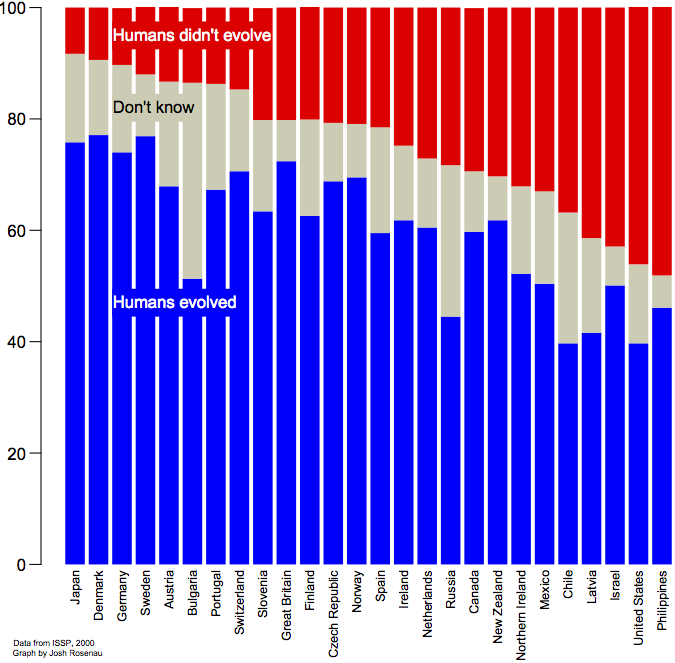While discussion of Israeli elections has largely (and reasonably) focused on the different parties’ views on the occupation of Palestine and the prospect of war with Iran, the ongoing effort to craft a coalition government may carry risks for science education, too.
Ha’aretz asked the leaders of the eleven parties competing for seats in the election a series of questions, including questions about evolution and climate change. On climate change, all seven who responded spoke in support of action. Unfortunately, the remaining four parties declined to answer, and all four are likely to be part of the governing coalition.
On evolution, only two of the seven enthusiastically endorsed the teaching of evolution; three opposed it, one dodged the matter, and another seemed to suggest that evolution be taught alongside creationism. Again, the four parties likely to be included in the ruling coalition all declined to answer, with a spokesperson for Prime Minister Benjamin Netanyahu’s Likud party dismissing the questions as “cheeky.”
Of those who answered, two have been part of coalitions with Likud before, and may be included in the new government. Kulanu’s Moshe Kahlon responded on evolution: “Israel inscribed on its flag the topics of research, curiosity and human development. That is our strength. We believe that in schools various approaches should be taught, including evolution.” Shas’s Arye Dery declined to go even that far, declaring: “As an ultra-Orthodox party that believes that our forefathers were Adam and Eve, Abraham, Isaac and Jacob, and that our holy matriarchs were Sarah, Rebecca, Rachel and Leah, we refuse to teach our children that they originated from apes.”
Yesh Atid’s leader Jacob Perry, who served as science and technology minister in the past, relegated science to an educational afterthought, saying: “The children of Israel must be raised on the values of the Bible and the Jewish tradition. But I am in favor of the expansion of horizons and teaching the history of humanity from other angles as well, and therefore I am not against also teaching evolution—but not only evolution.”
The left’s parties were largely united in support of evolution. Joint List’s Ayman Odeh, who grew up Muslim but is now an atheist, said, “I support teaching the theory of evolution as the theoretical foundation accepted today by science for the development of the variety of species on Earth.” Zehava Galon explained: “Meretz supports the teaching of the sciences, including the theory of evolution. We see no contradiction between teaching evolution and teaching the Bible or other Jewish studies in a pluralistic and open approach.” Zionist Union, the second-largest votegetter, largely dodged the question, with Isaac Herzog answering: “The state’s withdrawal from responsibility led to a loss of trust in the education system, which is at an unprecedented nadir. Our children are not receiving a sufficiently high level of education and we are forced to pay high sums merely to receive the minimal requirement. We believe that knowledge is power and therefore the Israeli education system under [our government] will be as pluralistic and as varied as possible, and as such it will enrich the students with knowledge and with many tools.”
Those pro-evolution parties took 42 seats, with the creationist parties who answered garnering 28 votes, and an additional 50 votes distributed among the conservative parties that declined to answer.
 The prospect of battles over evolution in Israel is likelier than one might expect. It was only last year that Israel mandated the addition of evolution to the nation’s secular middle school curriculum (and it remains out of the curriculum for state religious schools). Five years ago, the education ministry’s chief scientist spoke against evolution, leading to his rapid ouster. While the Israeli public is not as anti-evolution as the US, 43% told the International Social Study Programme in 2000 that it is “definitely” or “probably not true” that humans evolved from earlier species of animals. In the same survey, 46% of the US respondents were similarly anti-evolution, with only the Philippines (48%) showing higher rates of evolution rejection.
The prospect of battles over evolution in Israel is likelier than one might expect. It was only last year that Israel mandated the addition of evolution to the nation’s secular middle school curriculum (and it remains out of the curriculum for state religious schools). Five years ago, the education ministry’s chief scientist spoke against evolution, leading to his rapid ouster. While the Israeli public is not as anti-evolution as the US, 43% told the International Social Study Programme in 2000 that it is “definitely” or “probably not true” that humans evolved from earlier species of animals. In the same survey, 46% of the US respondents were similarly anti-evolution, with only the Philippines (48%) showing higher rates of evolution rejection.

